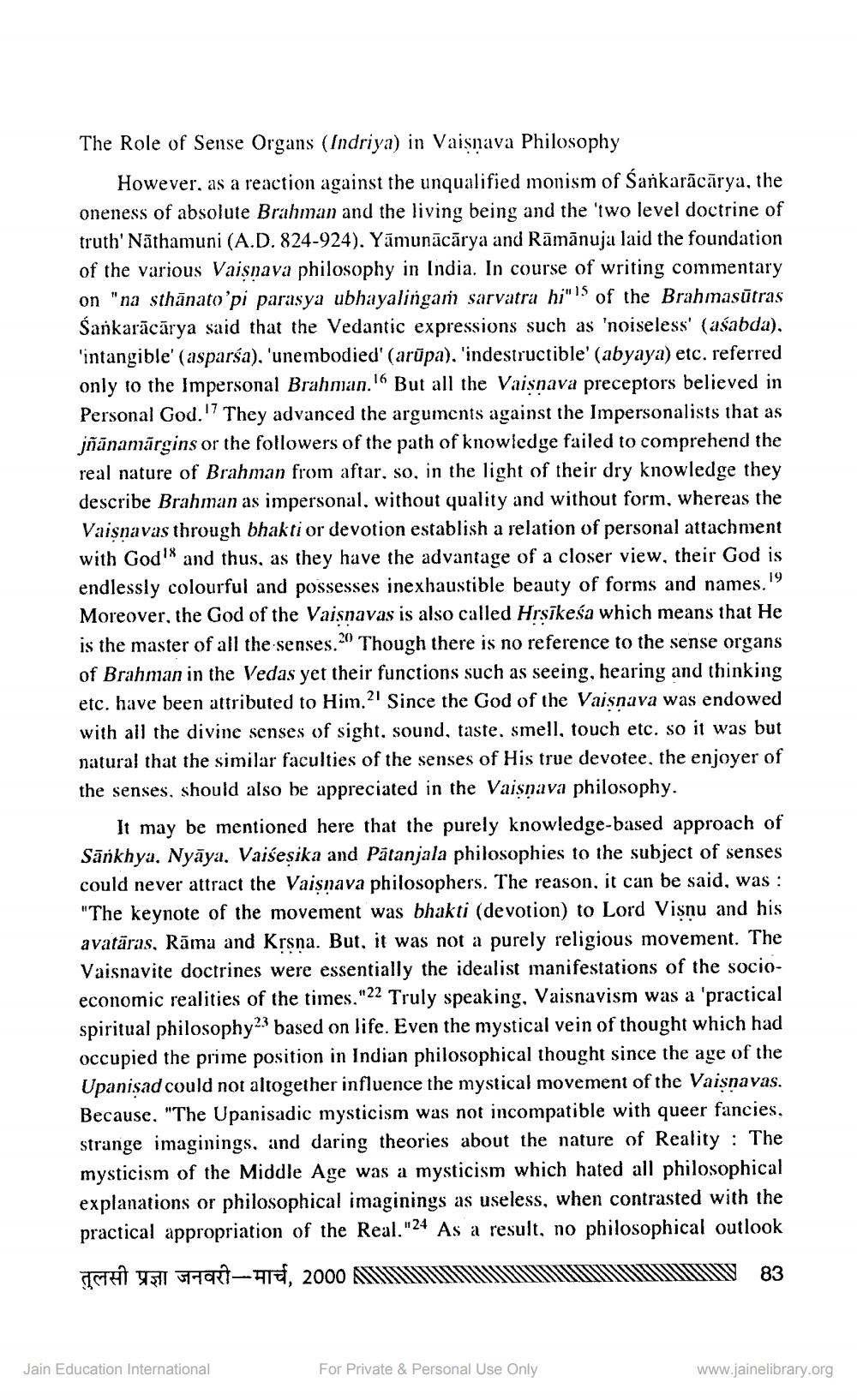________________
The Role of Sense Organs (Indriya) in Vaisnava Philosophy
However, as a reaction against the unqualified monism of Sankarācārya, the oneness of absolute Brahman and the living being and the 'two level doctrine of truth' Näthamuni (A.D. 824-924). Yāmurācārya and Rāmānuja laid the foundation of the various Vaisnava philosophy in India. In course of writing commentary on "na sthānato'pi parasya ubhayalingam sarvatra hi")s of the Brahmasūtras Sankarācārya said that the Vedantic expressions such as 'noiseless' (aśabda), 'intangible' (asparśa), 'unembodied' (arūpa), 'indestructible' (abyaya) etc. referred only to the Impersonal Brahman.' But all the Vaisnava preceptors believed in Personal God. 17 They advanced the arguments against the Impersonalists that as jñānamārgins or the followers of the path of knowledge failed to comprehend the real nature of Brahman from aftar, so, in the light of their dry knowledge they describe Brahman as impersonal, without quality and without form, whereas the Vaisnavas through bhakti or devotion establish a relation of personal attachment with God'' and thus, as they have the advantage of a closer view, their God is endlessly colourful and possesses inexhaustible beauty of forms and names. 19 Moreover, the God of the Vaisnavas is also called Hrsīkeśa which means that He is the master of all the senses. Though there is no reference to the sense organs of Brahman in the Vedas yet their functions such as seeing, hearing and thinking etc. have been attributed to Him.2 Since the God of the Vaisnava was endowed with all the divine senses of sight, sound, taste, smell, touch etc. so it was but natural that the similar faculties of the senses of His true devotee, the enjoyer of the senses, should also be appreciated in the Vaisnava philosophy
It may be mentioned here that the purely knowledge-based approach of Sankhya, Nyāya. Vaiśesika and Patanjala philosophies to the subject of senses could never attract the Vaisnava philosophers. The reason, it can be said, was : "The keynote of the movement was bhakti (devotion) to Lord Visnu and his avatāras, Rāma and Krsna. But, it was not a purely religious movement. The Vaisnavite doctrines were essentially the idealist manifestations of the socioeconomic realities of the times. "22 Truly speaking, Vaisnavism was a 'practical spiritual philosophy? based on life. Even the mystical vein of thought which had occupied the prime position in Indian philosophical thought since the age of the Upanisad could not altogether influence the mystical movement of the Vaisnavas. Because. "The Upanisadic mysticism was not incompatible with queer fancies, strange imaginings, and daring theories about the nature of Reality : The mysticism of the Middle Age was a mysticism which hated all philosophical explanations or philosophical imaginings as useless, when contrasted with the practical appropriation of the Real."24 As a result, no philosophical outlook JAHT 4402)-FT, 2000 ALIMW N AMWW 83
Jain Education International
For Private & Personal Use Only
www.jainelibrary.org




